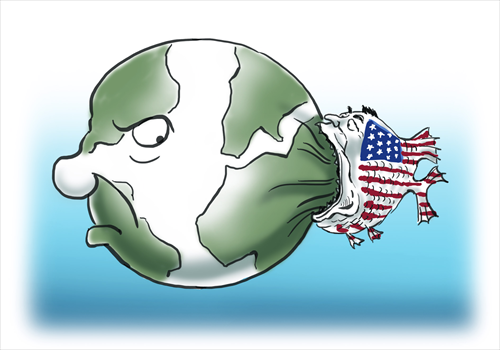Real threat to US comes in Europe, not Asia

Illustration: Liu Rui/GT
Since US President Barack Obama took office in 2008, Washington's strategic goal in foreign affairs has been the "pivot" to Asia. But the simmering Ukraine crisis struck a heavy blow to the US, who has to face the reality that the real threats come from Europe instead of East Asia, where the US is paranoid about facing challenges.
The current deadlock in Ukraine shows that both Washington and Moscow have no intention to escalate the situation. But the crisis still exists, and it reveals the ingrained geopolitical contradictions between the two sides. Ukraine happened to become the powder keg that detonated the long-standing conflict.
The end of the Cold War buried the Soviet Union and pushed the might of NATO and the EU eastward, which left Russia, the biggest part of the collapsed super power, with much less geopolitical leeway.
But Russia has crossed its name off on Washington's friends list because of their discrepancies in terms of culture and history as well as Moscow's ambition to restore its imperial glory. Russia believes when the opportunity comes and its strength recovers, it will retake the lost ground.
Yet Obama refuses to admit this. A month has passed since Crimea joined Russia, and the US keeps employing a two-pronged approach which includes economic sanctions and political negotiations.
Obama's restraint to Russia reflects his successive commitment to the pivot to Asia strategy. In his mind, the Asia-Pacific region, especially East Asia, is where the US will meet both hopes and challenges.
Washington expects to gain economic profits from this area, but also feels being challenged by China's rise. His expectation about enjoying the dividend of the economic growth of East Asia is right, but his concerns are misunderstandings of China's rise.
There is no doubt that so far China is the most likely country that can share or even replace US global dominance. But Washington cannot equate a change of international status with a threat to itself.
In fact, the most discussed topic among Chinese decision-makers and scholars is how to avoid the "Thucydides trap," in which confrontation is the only option between an established power and an emerging power.
Whether the trap can be avoided depends on how China and the US conduct their policy interactions, which is highly likely to produce some positive results.
Economic growth, the major impetus that drives China's rise, has had a spillover effect that has made the US as well as other countries benefit by offering an increasingly mature and international market, sufficient capital and possibly high technologies.
Obama himself admitted the possibility of a positive dynamics of competition between the US and China. Like two top-A students in a class, competition will continuously improve their performances.
The US Defense Secretary Chuck Hagel's just concluded Asia visit actually reflected such misunderstandings.
After Russia's integration of Crimea, some worry that China will follow suit and reclaim its lost territories when the time is right. Hagel's remarks and itinerary clearly showed Washington's intention to reassure its allies and warn China away from doing something assertive.
In recent years, China's proactive actions to guard its territorial security have been misinterpreted as "being assertive." In fact, this is a controllable rebound after being pressured by some countries such as Japan and the Philippines, which try every effort to widen the disputes under the auspices of the US. China has to take necessary countermeasures.
China's neighborhood policy must be evaluated comprehensively instead of partially in territorial disputes. China's new leadership has proposed several conceptions such as building a China-ASEAN community of common destiny.
When the Ukraine crisis took place, China exercised more restraints toward its neighbors, such as giving up forcefully blocking the Philippines resupplying its "stranded" vessel on Ren'ai Reef.
China is capable of taking some forceful actions, but it is the last option China wants to take. China is seeking a new type of relations with the US and wants to show an image as a responsible global power. But the efforts are somehow ignored by the West.
Facing the new dynamics in Europe and Asia, the US should readjust its foreign policy and rebalance to both areas. Obama's ongoing visit to Asia is drawing keen attention from the world. He is welcome if such a visit can boost more economic growth and cooperation in this area. But if he chooses to follow the old path and reassert China's threat to the regional stability, Washington's already imbalanced strategy will be further twisted.
The author is an associate research fellow at the Institute of International Relations, the Shanghai Academy of Social Sciences. opinion@globaltimes.com.cn